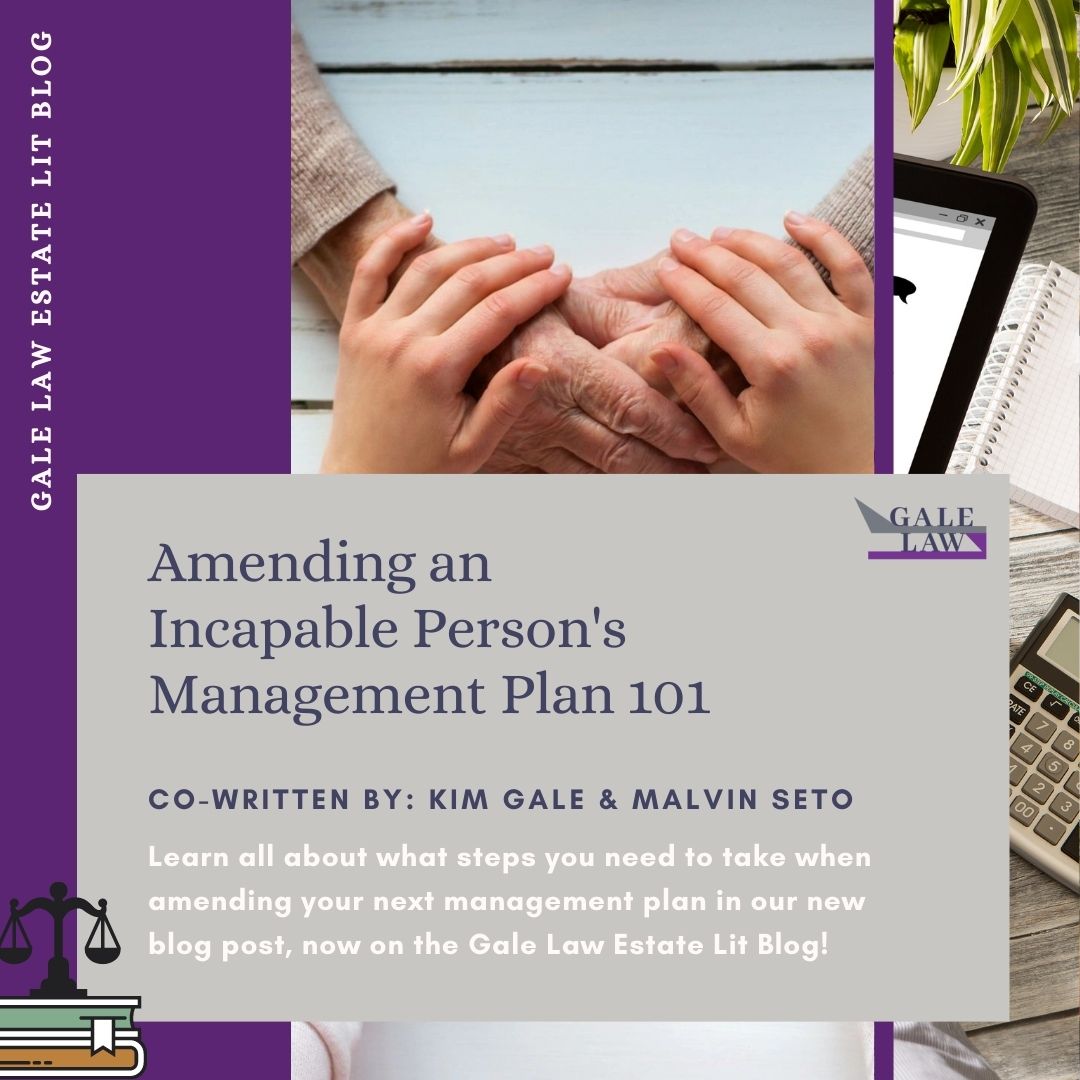
This article was originally published by The Lawyer’s Daily (www.thelawyersdaily.ca), part of LexisNexis Canada Inc.
Amending an incapable persons management plan 101
As wills, trusts and estates practitioners, it is important to understand the procedure of Guardianship Applications. It is crucial that these applications be completed correctly and that the client understands their duties.
What is guardianship?
When a person is mentally incapable of making decisions relating to their personal care or property, they will require a substitute decision maker to make choices on their behalf. A power of attorney is the typical way in which someone can designate another person to make decisions on their behalf. However, this can only be granted when the grantor is capable.
What happens when someone becomes incapable before the execution of a power of attorney?
A guardian is appointed by the court or Public Guardian and Trustee (PGT) on behalf of a mentally incapable person to make decisions on the mentally incapable person’s behalf. In order to be appointed, the prospective guardian must file an application. A guardianship for property application requires a notice of application, an affidavit, a management plan and a finding of incapacity. The notice, like any other notice in litigation, will provide the overview of the relief sought and the grounds for same. The affidavit will include the evidence that a prospective guardian will rely on in their application for guardianship. The affidavit will usually include the management plan and proof of a finding of incapacity such as a capacity assessment – the finding of incapacity is required in all guardianship applications. If the person is capable, then they do not require a guardian and could simply execute a power of attorney.
A management plan is the applicant’s proposed plan for the management of an incapable person’s property. The section that an applicant will typically find the hardest to fill out is section L, which are the expenses of the incapable person. These expenses need to be estimated for the needs of an incapable person for the entirety of their guardianship, which is difficult as circumstances may change. The plan must be followed by the guardian. If the guardian does not follow the plan, there is risk the Office of the Children’s Lawyer (OCL) or the PGT will object to their next passing of accounts. A passing of accounts is a court audit of the incapable person’s accounts. The guardian must prepare their accounting of all the funds that flowed in and out of the incapable person’s account for the review of the PGT/OCL and judge.
Amending a management plan
For some unforeseen circumstances as listed below, a lawyer may have to amend the management plan for their clients. Common circumstances for the amendment of a minor’s management plan include, but are not limited to:
- the receipt of monetary damages or settlements pursuant to a court order;
- monies payable to a minor in an estate; and
- the child has been named as a named beneficiary under policies such as a life insurance policy, RRSP or death
Common reasons to amend a management plan for incapable adults include, but are not limited to:
- proceeds or settlements from personal injury matters; and
- sale of a house.
Lawyers must pay special attention to the different procedural and service requirements for minors under the Children’s Law Reform Act (CLRA) compared to incapable adults under the Substitute Decisions Act (SDA).
Amending a management plan for minors
The powers and obligations of a guardian of property for a minor are contained in the CLRA. The CLRA does not authorize an amendment to a management plan for a guardian of property except by court order, as the court has the statutory power to approve amendments to a management plan for minors. The guardian of property must bring a motion to amend the management plan by filing a Notice of Motion. The Notice of Motion must be served to the OCL.
Amending a management plan for incapable adults
Section 38(11) of the SDA provides the PGT with the statutory authority to approve amendments of a management plan.
To amend a management plan, an applicant would be required to submit an application to the PGT’s office. In practice, the PGT would respond with a letter of acknowledgement upon receipt of the material. The PGT would review the material and submit a reply to the applicant and to court with comments on the application. Comments may include inquiries related to future accounting, financial management of the property, or the guardian’s compensation. Generally, this process would take a couple of months.
If the request was not approved, an applicant may apply for direction from the court under s. 39 of the SDA on notice to the PGT for court approval of the amended management plan. An amended management plan need only be served to the PGT.
It is important that the guardian for property understand their duties and it is imperative that the management plan is followed. If guardians cannot follow their own proposed budget, there will likely be repercussions in the form of the OCL/PGT (depending on the age of the incapable person) or a family member objecting to their accounts in their application to pass accounts. If the guardian is not following the plan and is not acting as a fiduciary, the court may remove them as guardian and/or seek for them to repay any costs they are deemed to have taken improperly (with interest).
Ultimately, when a guardian fails to fulfil their duties, it is the incapable person who suffers. Clients need to understand the significance of their responsibilities and it is our job as their lawyers to inform them.
